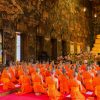When the July rains begin to fall and twilight settles over Chiang Mai’s ancient temples, a quiet transformation unfolds. The city’s spiritual core comes to life in a soft glow of candlelight, chants, and flower offerings—ushering in Khao Phansa, the start of Buddhist Lent, with a tradition that’s both serene and visually stunning: the Candle Float Parade.
Though not as globally renowned as Ubon Ratchathani’s grand candle festival in northeastern Thailand, Chiang Mai’s version offers something rarer—authenticity and intimacy. Here, you won’t find towering wax sculptures or choreographed shows. Instead, you’ll discover a more grounded, soulful ritual where locals and monks come together in peaceful ceremony, and travelers can witness the spiritual pulse of Northern Thailand in its truest form.
🌕 What Is Khao Phansa?
Khao Phansa, which takes place every year in July marks the beginning of the three-month Buddhist Lent. This is when monks retreat to their temples for study, meditation, and discipline during the rainy season. Laypeople often take vows of abstinence—no alcohol, smoking, or meat—and increase their merit-making through acts of generosity and temple visits.
For centuries, candles have symbolized wisdom and enlightenment in Buddhist tradition. Before electricity, candles also served the practical purpose of lighting temple halls through monastic study sessions during the dark, wet months. Over time, this tradition evolved into ceremonial processions—floating candles as offerings and guiding light for spiritual growth.

🕯️ The Candle Float Parade: A Chiang Mai Interpretation
In Chiang Mai, the Candle Float Parade is a gentle, contemplative event held around the evening of Khao Phansa at temples throughout the Old City, most notably at Wat Chedi Luang, Wat Phra Singh, and Wat Phan Tao.
Locals gather to light large beeswax candles, offer flowers, and walk clockwise three times around the temple’s main pagoda (a ritual known as wian tian). Each lap is symbolic: the first honors the Buddha, the second the Dharma (his teachings), and the third the Sangha (the monastic community).
What makes this unique in Chiang Mai is the fusion of spiritual purpose and local community. Schoolchildren, market vendors, and retirees alike participate—not for spectacle, but for merit. The mood is respectful, quiet, and reverent. Tourists are welcomed—provided they observe modest dress and temple etiquette.





